Share
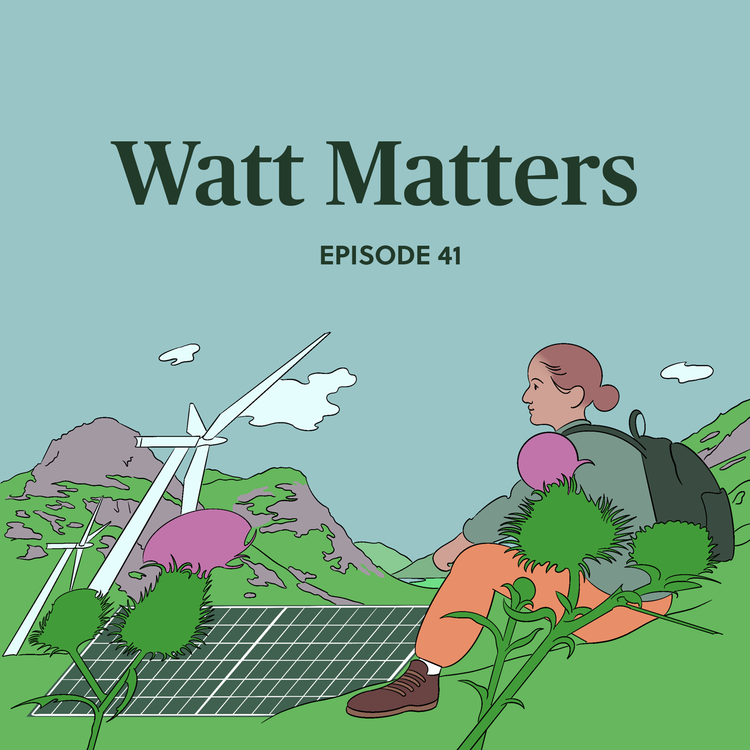
Watt Matters: The FORESIGHT energy transition podcast
Power to the people: UK’s net zero transition
Season 1, Ep. 42
•
The energy crisis put a spotlight on energy usage for British consumers as soaring bills dropped through letterboxes across the country. Renewable solutions can help tackle high prices, as well as lower emissions, and companies like Scottish Power are trying to roll these out.
Heat pumps, solar panels and other solutions offer healthier home environments, lower energy bills and higher home values, but the transition can be tricky. To get around this, companies need to be transparent and help consumers understand the benefits of renewable solutions.
On this week’s episode of Watt Matters, Chris Carberry, Smart Solutions Director at Scottish Power, joins Jan and David to discuss how companies can help households participate in the energy transition and ensure that no one is left behind.
Enjoy the show.
If you have any thoughts or questions about anything that has been discussed in this week’s episode, you can reach us at our Twitter accounts:
Chris Carberry: https://twitter.com/chriscarberrysp
Michaela Holl: https://twitter.com/CitizenSane1
Jan Rosenow: https://twitter.com/janrosenow
David Weston: https://twitter.com/DaveW_FORESIGHT
Kira Taylor: https://twitter.com/KiraTaylor15
@WattMattersPod: https://twitter.com/WattMattersPod
FORESIGHT Climate & Energy: https://twitter.com/FORESIGHTdk
Listen and subscribe to Watt Matters wherever you get podcasts. Follow us on Twitter at @WattMattersPod or email us at show@wattmatterspodcast.com. You can also find FORESIGHT Climate & Energy on LinkedIn: https://www.linkedin.com/company/foresight-climate-energy/.
Illustration: Masha Krasnova-Shabaeva.
Show notes via this link: https://foresightdk.com/wm-ep41/.
TRY FULL ACCESS TO FORESIGHT CLIMATE & ENERGY FOR €1 A DAY
Join over 100,000 policymakers, energy experts in business, finance, and academia, city leaders, and leading NGOs in having access to FORESIGHT Climate & Energy
GET YOUR 30 DAY TRIAL: www.foresightdk.com/subscribe/.
More episodes
View all episodes
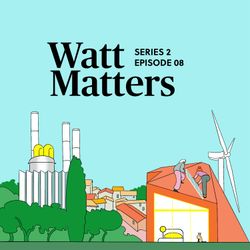
9. A competitive energy transition
37:47||Season 3, Ep. 9Download our award-winning app and enjoy access to all exclusive features. Click here to access on Apple or Android.This week marks the end of our series on the nexus of competitiveness and the energy transition. Over the past seven episodes, we've delved into the key questions facing European industry as it strives for economic strength and decarbonisation.In this final episode, David, Jan, and Kira reflect on the insights from our guests, revisiting our first episode on the European Commission’s Clean Industrial Deal and the Draghi report and exploring why competitiveness has become a central concern for lawmakers and business leaders alike.We’ve covered a lot, from understanding China's role in the global energy transition and navigating complex geopolitical landscapes, to examining the implications of the shifting world order on trade. We also explored practical pathways for European industrial decarbonisation over the next decade, the pivotal role of industrial energy efficiency, and the potential of Europe’s offshore wind sector. Finally, we tackled the important issue of power prices and the potential impact of a decarbonised economy on energy bills.Tune in to this final episode to hear our reflections and join the conversation. We also encourage you to share your own thoughts and insights on the key themes explored throughout this series—what have you learned, and what do you believe are the most important steps for Europe to take next?Download our award-winning app and enjoy access to all exclusive features. Click here to access on Apple or Android.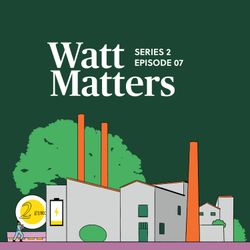
8. Power prices and competitiveness
45:20||Season 3, Ep. 8Download our award-winning app and enjoy access to all exclusive features. Click here to access on Apple or Android.The cost of power is inextricably linked to Europe’s competitiveness. Bram Claeys from the Regulatory Assistance Project joins Watt Matters to discuss the impact recent price fluctuations have had on European industry and what a decarbonised economy would mean for energy billsPower prices play a crucial role in the industrial sector. When energy prices rise, it often leads to increased production costs, which can either drive up product prices or squeeze profit margins. Many industrial companies are now exploring options for low-carbon energy sources. While these alternatives can provide more affordable power in the long run, they typically require a higher initial investment, which may, in turn, impact overall pricing structures.This week on Watt Matters, as we near the end of our investigation into competitiveness, we look at how the energy transition is affecting power prices.In this episode, the Watt Matters team is joined by Bram Claeys, a senior advisor at the Regulatory Assistance Project, to discuss the dilemma of sourcing cheaper and cleaner power while remaining competitive.Download our award-winning app and enjoy access to all exclusive features. Click here to access on Apple or Android.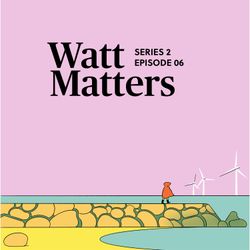
7. Seizing Europe’s innovative edge
47:40||Season 3, Ep. 7Download our award-winning app and enjoy access to all exclusive features. Click here to access on Apple or Android.The wind sector could be a key pillar of the European Union’s clean energy future and help bolster the bloc’s competitiveness, but the industry faces significant challenges.From permitting roadblocks to supply chain bottlenecks, the wind sector is struggling to meet installation targets at a time when Europe is thirsty for more low-cost, clean energy generation.On this episode of Watt Matters, Ulrik Stridbaek from Ørsted joins the team to discuss the recommendations of the company’s recent report on offshore wind, the potential of Europe’s wind sector and what is needed to support it.Please share your thoughts in the contribution section on the FORESIGHT app. Enjoy the show!Download our award-winning app and enjoy access to all exclusive features. Click here to access on Apple or Android.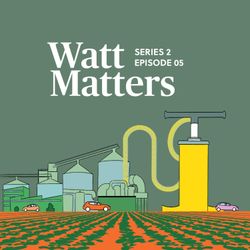
6. The efficient use of efficiency to drive European competitiveness
41:47||Season 3, Ep. 6Download our award-winning app and enjoy access to all exclusive features. Click here to access on Apple or Android.Making Europe’s industry more efficient can have big benefits: cutting energy consumption, boosting productivity, providing international market advantages and allowing companies to hit green goals. There are low hanging fruits that industries can take advantage of, but there needs to be more awareness and a shift in thinking towards efficiency as something that is strategic for companies to invest in to really drive efficiency gains.On this episode of Watt Matters, Clemens Rohde and Lisa Neusel from the Fraunhofer Institute for Systems and Innovation Research join the Watt Matters team to discuss the benefits of efficient industrial efficiency, the technology needed to achieve it and how this should be reflected in policy.Even if you have energy efficient technologies, you need to use them efficiently, Rohde says. Please share your thoughts in the contribution section on the FORESIGHT app. Enjoy the show!Download our award-winning app and enjoy access to all exclusive features. Click here to access on Apple or Android.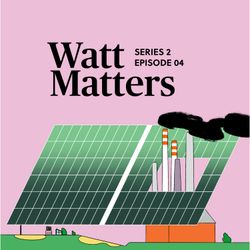
5. Industrial decarbonisation’s competitive edge
42:59||Season 3, Ep. 5Download our award-winning app and enjoy access to all exclusive features. Click here to access on Apple or Android.Europe’s energy-thirsty industries are suffering from high power prices, are at risk of being outpaced by global competitors and need to decarbonise to meet the European Union’s green targets.The energy transition can help address all of this, by increasing electrification, energy efficiency, circularity and more to develop a decarbonised, competitive industry in Europe.On this episode, Adèle Naudy-Chambaud from Schneider Electric joins the Watt Matters team to discuss how Europe’s industry can decarbonise over the next decade and what is needed from EU policy to support this.Enjoy the show!Download our award-winning app and enjoy access to all exclusive features. Click here to access on Apple or Android.
4. Trade and the transition under Trump
37:02||Season 3, Ep. 4Download our award-winning app and enjoy access to all exclusive features. Click here to access on Apple or Android.Since his return to the White House, President Donald Trump has caused shock waves across global trade. On this episode of Watt Matters, Joseph Francois from the World Trade Institute joins the team to discuss the new trade paradigm and what it means for the energy transitionThe world has entered a new paradigm of tense trade and geopolitical relationships at a time when it should be collaborating on decarbonisation. Donald Trump's re-election and pursuit of protectionist policies made matters even more complex, throwing a spanner in the works of the energy transition and reshuffling the country’s political alliances.Recorded before Trump’s wave of new tariffs in early April, on this episode of Watt Matters, the team is joined by Joseph Francois from the World Trade Institute to discuss where the energy transition fits into this new world order and the thinking behind Trump’s approach to trade.Enjoy the show!Download our award-winning app and enjoy access to all exclusive features. Click here to access on Apple or Android.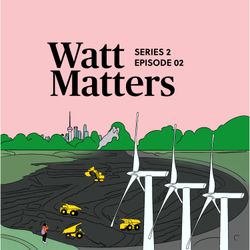
3. China’s impact on competitiveness
42:07||Season 3, Ep. 3Download our award-winning app and enjoy access to all exclusive features. Click here to access on Apple or Android.China is the world’s biggest emitter but also a key driver of the energy transition. The country is responsible for the biggest renewables rollout but also commissioned 70% of new coal capacity in 2024.The country has also been accused of unfair practices, with markets like the European Union and the United States placing tariffs on its goods. There are also fears that the EU could lose its competitive edge in producing certain technologies to China.On this episode of Watt Matters, Belinda Schäpe from the Centre for Research on Energy and Clean Air, author of China’s Climate Transition: Outlook 2024, joins the Watt Matters team to discuss China's role in the global energy transition and how to navigate geopolitical challenges in this.Enjoy the show!Download our award-winning app and enjoy access to all exclusive features. Click here to access on Apple or Android.
2. Flexing our grids
55:43||Season 3, Ep. 2Download our award-winning app and enjoy access to all exclusive features. Click here to access on Apple or Android.A flexible grid underpins Europe’s energy transition and helps bring more renewables online. According to statistics from SolarPower Europe, it could also bring big benefits, including saving the European Union €30 billion and avoiding 151 million tonnes of CO2 emissions every year by 2030.However, to make all of this a reality, Europe’s energy system infrastructure and energy market need to support flexibility.On this special, live episode of Watt Matters, recorded at the Solar Power Summit in Brussels, a panel of experts joins Kira to discuss flexibility's role in the energy transition and how Europe can improve it.The panel comprises: Joachim Balke, head of unit for infrastructure and regional cooperation at the European Commission’s energy department, DG ENER Juan Fernandez, chief operating officer at international renewable energy producer, SonnedixCatarina Augusto, senior grids and flexibility advisor at SolarPower EuropeSarah Van Cleve, vice president of sales and commercial excellence for Europe, the Middle East, and Africa at energy storage company FluenceEnjoy the show.Download our award-winning app and enjoy access to all exclusive features. Click here to access on Apple or Android.
1. Competitiveness and the energy transition
50:03||Season 3, Ep. 1Download our award-winning app and enjoy access to all exclusive features. Click here to access on Apple or Android.Today’s uncertain geopolitical context and the economic power of the United States, China, and others mean Europe must find new ways to collaborate and compete in the global economy. By doing so, European countries can create jobs, ensure growth, and, equally importantly, decarbonise.In late February 2025, the European Commission produced its Clean Industrial Deal. As the name suggests, it is a blueprint to achieve these goals by increasing efforts to decarbonise as well as boost productivity—particularly in the high-carbon-emitting, energy-intensive heavy industrial sector. On this first episode of the series, the Watt Matters team is joined by Phuc-Vinh Nguyen, head of the Jacques Delors Energy Centre, an independent think tank providing decision-makers with insights on energy transition issues. This conversation examines what exactly competitiveness means and why it matters to Europe and to society’s decarbonisation efforts.Download our award-winning app and enjoy access to all exclusive features. Click here to access on Apple or Android.